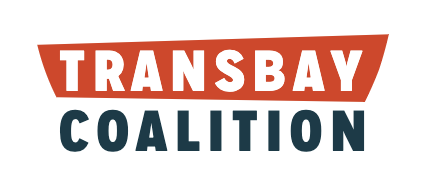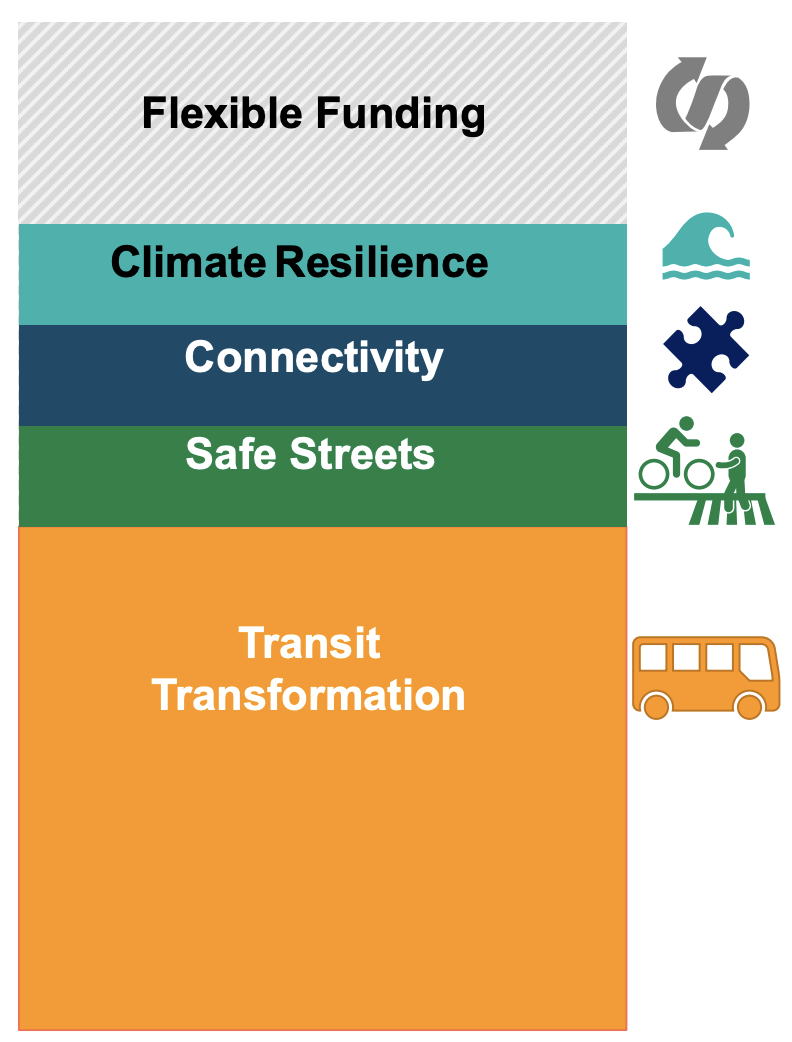On January 24, the Metropolitan Transportation Commission voted to pursue authorizing legislation in 2024 for a regional transportation funding measure that could go on the ballot as soon as 2026, and could be used in future years.
The proposal would authorize MTC to put a measure on the ballot with goals for transit transformation, safe streets, connectivity and climate resilience. MTC’s proposal would defer a recommendation about how much to allocate per category, allowing for stakeholder input before a measure goes on the ballot. Also, MTC proposes to have a flexible category that can change with evolving needs; interestingly, 70% of voters preferred that the measure have flexibility rather than fully fixed expenditures.
The proposal would allow MTC to choose from among a menu of funding options. The options include an income tax, payroll tax, sales tax, parcel tax, or a Vehicle Miles Travel Charge no sooner than 2030. The measure could cover all 9 counties of the Bay Area, or a subset of the 9 counties.
Given the public demand for a well-coordinated transit system, MTC’s proposal would strengthen its role in regional transportation network management, with oversight over fare integration, schedule coordination, mapping and wayfinding, and other customer-facing operating policies that would benefit from a coordinated regional approach. Based on earlier feedback, the proposal focused on coordination and did not mention consolidation.
MTC’s proposal also includes a Travel Demand Management Provision to require large employers of 50 or more employees to provide transit benefits. MTC staff noted that more would be needed to flesh out this proposal.
If MTC places the measure on the ballot, the voter approval threshold would be two thirds. Interestingly, the MTC’s proposal would also allow the measure to be placed upon the ballot by a qualified voter initiative (such as San Francisco’s 2018 Measure C), subject to a simple majority vote.
Topics that generated the most discussion at MTC in January were geographical distribution and funding for highway expansion.
Some commissioners wanted to make sure that the measure would provide benefits to local voters. MTC’s proposed to defer the specifics of the distribution of spending for categories subject to stakeholder and legislative discussions. It’s important for voters to perceive a measure as fair. And also, because important goals of the measure include funding regional services and regional coordination across county boundaries, it wouldn’t work to allocate the funding to local entities with full ability to opt out.
The MTC decided not to vote on whether or how to allow funding from the measure to be spent on expanding highway capacity. A large set of transit and environmental advocacy groups had sent a letter opposing using funding for highway widening, while some business and labor groups supported a mix of projects including highway widening. On the day that MTC voted, staff made a recommendation that the measure should fund highway capacity increases only projects with express lanes or high-occupancy toll lanes. But with dozens of public comments opposing highway widening, the MTC did not include language about highway widening in the motion they approved.
Senator Scott Wiener has submitted a placeholder bill, SB925 for the authorizing legislation, which is expected to be fleshed out including MTC’s recommendations. More detailed language is expected to be public prior to the bill’s first hearing in committees in March and April. Wiener had led efforts in 2023 to successfully secure funding from the state budget to defer the fiscal cliff facing Caltrain, BART, SFMTA, AC Transit and other agencies.
MTC advances regional funding measure authorizing legislation
On January 24, the Metropolitan Transportation Commission voted to pursue authorizing legislation in 2024 for a regional transportation funding measure that could go on the ballot as soon as 2026, and could be used in future years.
The proposal would authorize MTC to put a measure on the ballot with goals for transit transformation, safe streets, connectivity and climate resilience. MTC’s proposal would defer a recommendation about how much to allocate per category, allowing for stakeholder input before a measure goes on the ballot. Also, MTC proposes to have a flexible category that can change with evolving needs; interestingly, 70% of voters preferred that the measure have flexibility rather than fully fixed expenditures.
The proposal would allow MTC to choose from among a menu of funding options. The options include an income tax, payroll tax, sales tax, parcel tax, or a Vehicle Miles Travel Charge no sooner than 2030. The measure could cover all 9 counties of the Bay Area, or a subset of the 9 counties.
Given the public demand for a well-coordinated transit system, MTC’s proposal would strengthen its role in regional transportation network management, with oversight over fare integration, schedule coordination, mapping and wayfinding, and other customer-facing operating policies that would benefit from a coordinated regional approach. Based on earlier feedback, the proposal focused on coordination and did not mention consolidation.
MTC’s proposal also includes a Travel Demand Management Provision to require large employers of 50 or more employees to provide transit benefits. MTC staff noted that more would be needed to flesh out this proposal.
If MTC places the measure on the ballot, the voter approval threshold would be two thirds. Interestingly, the MTC’s proposal would also allow the measure to be placed upon the ballot by a qualified voter initiative (such as San Francisco’s 2018 Measure C), subject to a simple majority vote.
Topics that generated the most discussion at MTC in January were geographical distribution and funding for highway expansion.
Some commissioners wanted to make sure that the measure would provide benefits to local voters. MTC’s proposed to defer the specifics of the distribution of spending for categories subject to stakeholder and legislative discussions. It’s important for voters to perceive a measure as fair. And also, because important goals of the measure include funding regional services and regional coordination across county boundaries, it wouldn’t work to allocate the funding to local entities with full ability to opt out.
The MTC decided not to vote on whether or how to allow funding from the measure to be spent on expanding highway capacity. A large set of transit and environmental advocacy groups had sent a letter opposing using funding for highway widening, while some business and labor groups supported a mix of projects including highway widening. On the day that MTC voted, staff made a recommendation that the measure should fund highway capacity increases only projects with express lanes or high-occupancy toll lanes. But with dozens of public comments opposing highway widening, the MTC did not include language about highway widening in the motion they approved.
Senator Scott Wiener has submitted a placeholder bill, SB925 for the authorizing legislation, which is expected to be fleshed out including MTC’s recommendations. More detailed language is expected to be public prior to the bill’s first hearing in committees in March and April. Wiener had led efforts in 2023 to successfully secure funding from the state budget to defer the fiscal cliff facing Caltrain, BART, SFMTA, AC Transit and other agencies.

